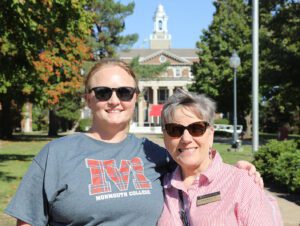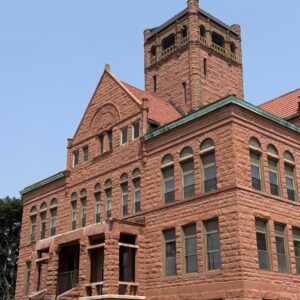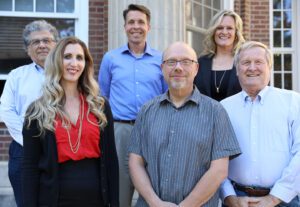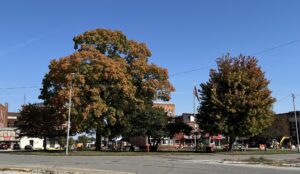Established in 2004, Monmouth College’s Hatch Awards recognize outstanding work by its faculty in the areas of teaching, scholarship and service.
Three years after the award program was established, Brad Sturgeon joined Monmouth’s faculty as its physical chemist. Sturgeon is a big believer in those three categories – so much so that he’s devoted a great deal of thought to what constitutes a faculty member’s successful allocation of time to each.
“When you put a weight on the value of each – the time devoted to each – you can really answer the questions ‘Who are you?’ and ‘What is my function at the college?'” said Sturgeon, who speaks on the topic at new faculty orientation sessions, drawing on his 25 years of experience with quantum mechanics formulas. “If your numbers are 25% teaching, 1% service and 74% scholarship, you’re at an R1 institution, doing research. That’s not a Monmouth College formula.”
But at Monmouth, the pendulum can’t swing too far the other way, either, as service and scholarship are important components of a faculty member’s time, even while teaching is the primary focus.
The three categories also happen to be a way to summarize Sturgeon’s 17-year career on campus, and he’s had several highlights in each while keeping, roughly, a ratio of 50% teaching, 25% service and 25% scholarship.
Teaching
Sturgeon joined the faculty as an assistant professor of chemistry in 2007, teaching physical chemistry, a form of the discipline that also incorporates mathematics and physics. He was promoted to associate professor in 2013 and to full professor in 2021. Sturgeon believes that with each step up the ladder, a faculty member can devote more time to service and scholarship. In their assistant professor years, as they’re developing their teaching style and focusing on course preparation, the daily rigors of the classroom require more attention.
Sturgeon’s teaching duties focused on a two-semester physical chemistry sequence with upperclassmen, but he was also involved with the general chemistry instruction for first-year students.
“Our department believes it’s important to have all the faculty interact with students right up front,” he said.
Sturgeon also taught outside of that sequence during the recent “Global Perspectives” and “Citizenship” era of the College’s curriculum, developing courses on food and the green initiatives surrounding water.
Water was also a main focus of his two-week January-term trips with students to Andros Island in the Bahamas, which was the subject of his official “Last Lecture” talk in March. There, Sturgeon told the audience that he’s been traveling to that Caribbean spot, off and on, for 45 years. One of the scientific tools required in the Bahamas is an underwater drone – more on that in a bit.
Service
Sturgeon has taken his turn in a leadership position of several faculty groups on campus, chairing the committees on Student Activities and Support, Curriculum, and Faculty and Institutional Development. He’s also chaired the local section of the American Chemical Society.
More than a decade ago, Sturgeon got in on the ground floor of what has become a spring staple on campus.
“I essentially started Scholars Day at the College in 2011,” he said. “I gave it up after a few years due to a sabbatical and picked it back up in the past few years.”
The April event is held on the same day as the College’s Honors Convocation and allows students the opportunity to present their research or display their talents in the arts.
He’s also carried on a Monmouth tradition with MACTLAC, the Midwest Association of Chemistry Teachers at Liberal Arts Colleges. Sturgeon serves as the archivist for the organization, which seven decades ago was the brainchild of legendary Monmouth professor William Haldeman.
Scholarship
“Scholarship makes us different from a high school teacher,” said Sturgeon, who does what many Monmouth faculty members do, involving students in the research. “You’ve got to have this component as a college professor, but too much of it, and you’re not teaching.”
One of his most noticeable scholarly endeavors is the Monmouth Coffee Project, which started as a partnership pertaining to soft drinks with business professor Keith Williams. As the College dreamed, planned and eventually built the Center for Science and Business, which was completed in 2013, that science-business collaboration was frequently highlighted.
It actually blurs the line between scholarship and service, as Sturgeon’s Scots Roast coffee has been a hit with the campus community and alumni the past several years.
Another of his contributions in the category is the “maker” tools he’s helped bring to campus, such as the underwater drone, and also including virtual reality and 3-D printing.
Sturgeon said his “maker mentality” is why he got into chemistry in the first place.
“As a kid, I loved to take things apart,” he said. “I was always modifying my bicycle. I need to understand how things work. Chemistry was a good place to ask those kind of questions. I loved asking questions in chemistry and getting an answer.”
Bringing advanced software to campus such as Mathematica, Igor and computational chemistry package WebMO/Gaussian is another way Sturgeon has contributed, and he’s authored more than two dozen peer-reviewed publications.
Sturgeon also believes that with each of the steps above, a professor’s focus can expand, from a local perspective at the assistant level, to regional as associate, to national as a full professor.
What’s next?
Sturgeon may be done teaching at Monmouth, but he’s not about to rest on the laurels of his successful tenure at the College.
“I’m not going to go sit on a couch and fall asleep,” he said.
He is going to leave Monmouth, though, joining back up with his wife, Kath, who works at the National Academy of Medicine in Washington, D.C. The couple will live in Alexandria, Virginia.
He plans to continue being an active participant in the maker culture, which represents a technology-based extension of do-it-yourself culture that revels in the creation of new devices as well as tinkering with existing ones.
As an example, Sturgeon is connected with the “right to repair” movement, which seeks to require manufacturers to sell parts, tools, and provide the necessary documents to anyone who wants to repair their electronics at home or in local repair shops.
He also hopes to promote science literacy by educating communities and continue with a pair of his major hobbies, woodworking and brewing history and science. Those who’ve dined at the Patton Block restaurant in downtown Monmouth have had the opportunity to sample the DeNovo beer from the city’s only craft brewery, which Sturgeon started with alumnus Steve Murmann ’80.
And all if that wasn’t enough, Sturgeon said he might steer clear of falling asleep on the couch even longer by writing a book that lays out winning formulas for faculty members regarding teaching, scholarship and service.
***Courtesy of Barry McNamara, Monmouth College***








